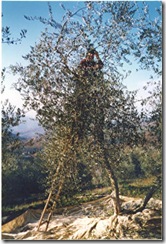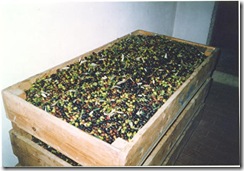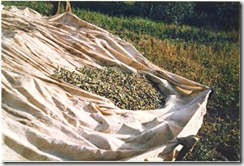The fragrant olive oils of Tuscany are unique; they are less delicate than Ligurian varieties, and less full than varieties grown and pressed in the south. Our oils are distinctive in their balance of fruity flavor and peppery undertones, and much dedication goes into their production.
Olives are still picked by hand, and they are combed from the tree branches with a long instrument that resembles a strange pair of scissors, and then put into baskets. While some areas are using more mechanical methods of harvesting the olives, these are not yet ideal, as they can damage both the olives and the trees. The old method, known as Brucatura, still prevails. In Tuscany, the olives are always picked by hand, for Tuscans do not believe that an olive that falls to the ground is worthy of our fine olio; such an olive could be damaged and spoil an entire pressing.
Because it is done by hand, olive harvesting is difficult work. Usually, the entire family, and often their friends, are called upon to pitch in with the farm workers for the harvest. The olives are picked while green and timing is vastly important. Once the fruit is off the trees, it must be rushed to the press in order to avoid spoilage. An olive is 20 percent oil, and while this may not seen like a lot, the high fat content can cause the olives to spoil quickly. Fermentation also becomes an issue once the olives are picked. So, it is on to the presses as quickly as possible.
As I said, each olive is about 20 percent oil, so it takes a great many olives to produce a liter of oil; about 200 hundred per liter is an average number. However, among the finest oils, it sometimes takes the fruit of an entire tree to produce a liter.
Here in Tuscany, as in most of Italy, the olives are pressed at a communal mill which is called a Frantoio. At the frantoio, many growers bring their olives to be pressed, but each grower is proud of his olives and comes along with them to the mill, to be sure that only his harvest goes into the pressing. Each grower must make an appointment for his pressing, and sometimes his entire family comes along to await the final product.



